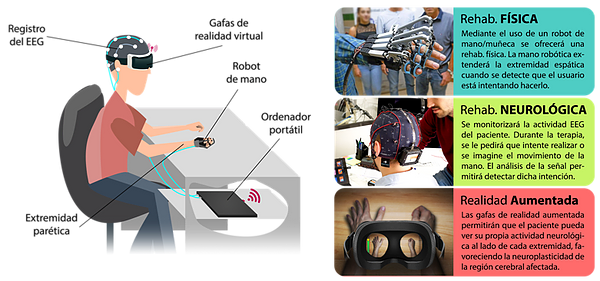Funding Entity: Ministry of Science and Innovation of Spain.
Reference: Research Project RTC2019-007350-1
Responsible company: Laureano Ayuso, CEO de Ticcyl Digital S.L. (Salamanca - Spain).
Participating entity: University of Valladolid: ITAP Research Institute y Biomedical Engineering Group. “Benito Menni” Hospital Center (Valladolid - Spain).
Duration: 01-September-2020 - 31-December-2023
Official project webpage: http://www.gib.tel.uva.es/m3rob/
In this innovative experimental development project, a neurorehabilitation platform will be developed (M3Rob - Mind - Hand - Robot Wrist), that will allow the realization of new therapies to address, simultaneously, the rehabilitation of cognitive and neuromotor functions, for patients who have suffered a stroke. With this platform, patients will be able to perform therapies oriented to activities of daily living for neuromotor rehabilitation, and it will also allow training / rehabilitating the higher cognitive functions affected by their injury. This approach to neuromotor and cognitive rehabilitation will improve the patient’s rehabilitation and benefit from the combined effects of both therapeutic approaches.
The M3Rob platform will use the measurement of electromyography (EMG) and electroencephalography (EEG) signals to detect the intentionality of the patient’s hand-wrist movement. The EMG will be used to help in motor rehabilitation, while the EEG through BCI technology (Brain Computer Interface) will be used as a cognitive rehabilitation tool, aimed at achieving an improvement in the patient’s cognitive impairments in the areas of: learning, orientation, memory, etc. The monitoring and processing of EMG and EEG will allow the generation of on-line commands, which will be used to control a modular mechatronic device consisting of a hand exoskeleton and a 3-degree-of-freedom wrist rehabilitation module (pronation / supination, flexion / extension and abduction / adduction), with which the patient can perform personalized assistance therapies for neuromotor and cognitive rehabilitation, through the use of multimedia augmented reality (AR) environments oriented towards activities of daily living (ADL). Haptic control strategies will be implemented in the mechatronic device to modulate the physical interaction between the patient and the device, while at the same time the on-line dynamic adaptation of the degree of assistance received by the patient during the therapy will be carried out, through the application of the paradigm “assist as needed”.

Clinical trials will be carried out with patients in healthcare and clinical settings, given the importance of evaluating the efficacy and clinical relevance of the motor-cognitive neurorehabilitation platform that is developed, for which the collaboration of qualified healthcare professionals is essential. For this reason, this project includes the participation of the Benito Menni Hospital Center, where these clinical tests will be carried out.
On the other hand, and in order to facilitate its entry into the market, the platform that is developed must be low-cost, easily transportable, modular and configurable, both from a functional and structural point of view, which will allow its use not only in rehabilitation centers (hospitals, clinics, care centers for the elderly, etc.) but also in the domestic sphere. The platform is complemented with a software environment for the local / remote management of therapies, patients, historical data collected on-line during the execution of therapies, etc.